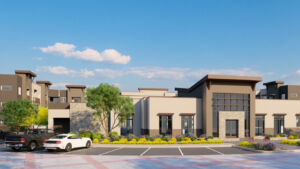Dan Puente founded DP Electric in 1990 and has worked and thrived here in the Valley in his 30 years in business.
Puente has been involved in the Arizona Builders Alliance for the past 19 years, and has served on various committees as well as the ABA Board of Directors for six years until finally getting his turn in the chairman’s seat. Puente’s biggest passion in the industry is workforce development and he is very involved in the Build Your Future Arizona (BYFAZ) initiative that was launched in 2019. As chairman, Puente’s goal was to develop a cohesive workforce development model that would link not only the BYFAZ initiative, but other programs industry groups and companies were utilizing.
“The problem with the workforce development effort in the past was that there’s always been all of these different entities doing something,” Puente said. “The problem was it was just so fragmented. Then when BYFAZ came around we thought, ‘OK, here’s one voice, maybe we can get the whole industry around that.’ That’s where I felt that the ABA would come in and support that, and we did get some traction with that and were working on that, but then the COVID thing happened and we all paused and focused on that.”
Like the rest of the world, the construction industry had to focus on working through the issues surrounding the COVID-19 pandemic and coming up with ways to stay safe on the job. AZRE Magazine sat down with Puente to discuss how the ABA provided solid guidance for the industry and how the pandemic has challenged even the most experienced industry experts.
AZRE: What have been the most unique aspects of dealing with the COVID-19 pandemic?
DP: In a contract, there is a Force Mejuer Clause and I think this is the first time that that clause has been discussed. In reality, this is something that is uncontrollable and unforeseen and it’s something you really can’t be responsible for, to a large degree. This is definitely a first. The scary part, initially, was the unknown. Are we all going to shutdown, are we all not going to work, what’s going to happen? Naturally that fear is there, that uncertainty is there and then you just take it day by day and see what’s happening. Once we were deemed essential, I knew that there was hope for our industry. I’m also happy I live in Arizona. I can’t even imagine what the restaurant industry is going through and how large corporations like Sweet Tomatoes just shut down because their model doesn’t fit the current environment. I can’t imagine where some of those people are.
AZRE: What role does the construction industry play in helping the economy recover from the COVID-19 economic slowdown?
DP: I think that we’re fortunate to be in this industry and I think, as a whole, people don’t realize how impactful the construction or real estate industry is to the economy. If you look at the top producers in the economy, I believe construction is No. 3. Healthcare is No. 1 and I believe technology is up there at No. 2. Healthcare; we’re building hospitals; technology; we’re building data centers; we’re supporting those other industries that are right above us. I think in general, construction and the real estate world is a huge driver in the national economy. I don’t think people realize that until you really dissect that and realize that these industries are intermingled.
I will say, from our side, there is a huge sense of gratitude to be working in this industry because we’re all still working and we’re considered essential. We all feel very blessed and fortunate that we’re still working, and that has a positive effect on your psyche.
AZRE: Why is ABA leadership and guidance so valuable for companies during the pandemic?
DP: I think what’s unique about the ABA is the ABA is comprised of a bunch of different business leaders from a bunch of different environments and sectors. There are a lot of great minds that are coming together to help educate and inform. The message comes from that environment and it speaks to that environment, so it is in touch with the audience. I’m on the board, I’m speaking on behalf of my industry and my team, there’s a general contractor on the board, he’s speaking from his viewpoint and same with an attorney. When you get all of those different minds and everybody is pretty engaged and not afraid to voice their opinion and we have discussions and we all get to a place and we pass the baton over to (ABA president) Tom Dunn or the chairperson.
Our board meetings are how we can support our members during this time and not necessarily about workforce development or education programs or whatever the case may be. I think it’s important and I think it’s well-received and I think the information that coming out of these meetings is solid.
AZRE: How has your experience with the ABA evolved over the years?
DP: I started out as a learner and I was just trying to learn and educate myself and also, put myself in the same room as my peers and my competition or my clients, whatever the case may be. Although you are getting educated, you’re also building relationships, and I think that is one of the more valuable things about the ABA is the community type spirit that is there. I’ve been involved for 19 years and I really feel it is an extension of who we are as a company. We use it for training and education and I did it myself, personally, and other leaders in our industry did as well and we do it through our organization. If you appreciate the value of mentorship and what’s given to you and you give that back, then it’s only natural to be that guy who’s sharing some of his lessons learned or his successes, to help someone else come up. That’s an obligation that I feel strongly about, giving back.
AZRE: How does the ABA help foster a competitive, yet fair and civil, business environment for construction firms in the state?
DP: It’s a large industry and I think that the ABA members are at the top tier of contractors and subcontractors. That’s why you don’t see any dirty tactics. I can remember two or three different situations where someone did something inappropriately and generally, it’s like a small town and that gets around and it doesn’t bode well for you or your reputation. Everyone is watching and everyone knows that. There is just a common respect. I sit in the room with a lot of my competition and we get along great, but that doesn’t mean come bid day we’re going after a job we’re going to be aggressive in our approach and so are they. If they win it, great, if we win it, great. In some cases, we even help each other out by sharing labor and doing different things like that.



